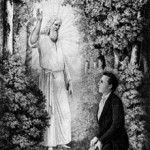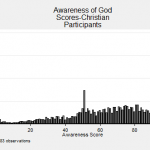With Mitt Romney making a run for a presidency, people are thinking about his religious faith, Mormonism, and one of the questions that comes up is whether or not it’s a cult. Various answers have been given, including yes , no, and no. I would suggest that the correct answer to this question is: “no, Mormonism is not a cult, but it used to be.”
Let’s start off by thinking a little bit about Mormonism. Every couple of years or so, I have Mormon missionaries knock on my door at home, and, as a sociologist who studies religion, I am probably one of the few people who wants to talk with them more than they want to talk with me. I’ve even invited Mormon missionaries to come and speak to my sociology of religion class on several occasions.
When I talk with these young men and women, I’m struck by two things. One, they are very impressive people. Often just out of high school, they have taken a year or two off, at their own expense, to spread their religion. I really appreciate that level of commitment; they are invariably sincere and kind people.
Two, I am surprised by how very different their religion is from mine. As the missionaries have told me, Mormonism differs from what we might call historical Christianity on many key points. Based on my conversations with them, and some poking around Wikipedia and other sources (and I’m not at all an expert on Mormon doctrine), some of these differences include:
- Mormons have an additional book of scripture, The Book of Mormon, that was found in New York state in the early 1800s
- Jesus came to the Americas after his resurrection
- God has a physical body, not being spirit
- A Goddess Heavenly Mother exists with a Heavenly Father
- There is more than one God
- There are three heavens, and to get to the highest (or best) heaven, you should be a Mormon. (One missionary explained to me that as a non-Mormon religious person, I would be in the middle heaven)
- That when things go well for Mormons, they will someday become like God in getting their own inhabited planet to govern in a godlike capacity
- Mormons using living people as proxies to baptism people who have already died without opportunity to be baptized themselves
- There are many inhabited worlds out there, governed by heavenly bodies, including Kolob–a planet physically closest to the throne of God
- Mormons have a fairly complex cosmology of what happened in Heaven that led to Jesus coming to Earth (and other planets as well, I think).
 Mormons have some “unconventional” cultural practices, including something called Mormon underwear. (As an evangelical Christian, however, I’m not going to harp too much on these unconventional cultural practices–don’t want to throw stones in glass houses.)
Mormons have some “unconventional” cultural practices, including something called Mormon underwear. (As an evangelical Christian, however, I’m not going to harp too much on these unconventional cultural practices–don’t want to throw stones in glass houses.)
Clearly there are substantial, meaningful differences between Mormonism and historical Christianity. (I’ll leave it to others to debate the validity of Mormonism’s claims. I don’t believe them, but, hey, I guess that’s why I’m not a Mormon). But does this mean that Mormonism is a cult? To answer that question, we need to look at what is a cult.
In sociological research, there have been various, sometimes precise, definitions of cults, but they tend to share two basic features. Cults have beliefs and practices that differ from the mainstream *and* they are viewed as deviant.
As I’ve described above, Mormons clearly differ from mainstream Christianity, in both belief and practice, but it’s the second aspect of cults–being viewed as deviant–that leads me to conclude that they’re not a cult at all.
First of all, there are 6 million+ Mormons in the United States, which is about the same as the number of Jews. Also, Mormons are widely accepted in just about every aspect of cultural life. Mitt Romney is the front-running Republican candidate for president. Harry Reid, the Democratic senator from Nevada, is the Senate Majority Leader. Stephenie Meyer wrote the popular Twilight series. There are a host of famous and not-so-famous Mormons. The Mormon Church as an institution has been an active and effective agent in various political campaigns (famously California’s Prop 8 regarding gay marriages).
the number of Jews. Also, Mormons are widely accepted in just about every aspect of cultural life. Mitt Romney is the front-running Republican candidate for president. Harry Reid, the Democratic senator from Nevada, is the Senate Majority Leader. Stephenie Meyer wrote the popular Twilight series. There are a host of famous and not-so-famous Mormons. The Mormon Church as an institution has been an active and effective agent in various political campaigns (famously California’s Prop 8 regarding gay marriages).
Various recent surveys have documented this widespread acceptance. A Gallup Poll conducted in June, 2011 asked Americans “If your party nominated a generally well-qualified person for president who happened to be…Mormon, would you vote for that person?” and 76% said yes.
This acceptance, however, hasn’t always been the case. In the 1800s, Mormonism was heavily persecuted by non-Mormons; in fact, that’s why they are centered in Salt Lake City–to escape persecution. Even in the mid-20th century, Mormons seemed to have been viewed as much odder than they are now. (This is my impression, anyway, but I don’t have any data on it).
The Mormon Church itself has helped its widespread acceptance with its embrace of traditional, often conservative, American values. In 1978, it allowed Blacks to take up full priesthood in the Mormon church, a change that removed a major stumbling block in peoples’ acceptance of the church. The Mormon Church seems to actively support and encourage its members in the military. The self-presentation of most Mormons is very wholesome and clean-cut. Mormons espouse family values, and so on.
So what does all this mean for non-Mormons? It’s time to drop the “c” word in talking about Mormons. It’s both sociologically inaccurate and offensive in today’s cultural climate.
Also, let’s judge Romney on the basis of the things that matter in evaluating presidential candidates, such as policies, experience, judgement, and height. Religion shouldn’t matter, and we have a word for not voting for somebody because of their religion–discrimination.











